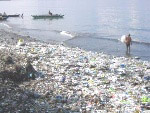Ocean Conservancy Counts 7.4 M Pounds of Trash in Cleanup

Trash on this Manila, Philippines, beach threatens marine life, ecosystems, and coastal economies.
Ocean Conservancy released "Trash Travels: From Our Hands to the Sea, Around the Globe, and Through Time" (pdf), which describes and measures the marine debris problem facing wildlife, economies and marine ecosystems.
Last year, nearly 500,000 volunteers around the world combed their local beaches and waterways collecting trash and recording the data during the 24th annual International Coastal Cleanup – the largest volunteer effort of its kind. Volunteers removed and recorded 7.4 million pounds of trash in 108 countries and locations, 45 U.S. states and the District of Columbia. The report features the group’s annual Marine Debris Index – the world’s only country-by-country, state-by-state analysis of trash in the oceans and waterways.
Vikki Spruill, president and chief executive officer of Ocean Conservancy, said: “Momentum is building. There is a growing understanding of the significant impact trash has on wildlife, the economy and the productivity and resiliency of our ocean. The data generated by hundreds of thousands of dedicated volunteers around the world provide us with a global snapshot of the trash in our ocean, but cleanups alone cannot solve the problem – it’s time to stop marine debris at the source. From design to disposal, we all have a role to play: corporations can reduce packaging, governments can enact strong marine debris policies, and each of us can choose re-usable items, recycle when possible and put trash in its place.”
Plastics make up approximately three-quarters of all trash floating in the ocean. Birds, fish and other wildlife can easily mistake smaller marine debris for food, choking the animals, or blocking the digestive system. For instance, sea turtles can easily mistake a plastic bag for a jellyfish with deadly consequences. Whales and dolphins can face a similar fate by ingesting larger items. Ropes, old fishing gear, and other larger debris items can pose an entanglement danger to wildlife, damage sensitive ocean habitats like coral reefs, and interfere with maritime safety and navigation.
“Eliminating the threat of marine debris will help improve the ocean’s resilience. Our ocean is our life-support system, and when we trash our ocean we are trashing our own health and well-being,” concluded Spruill.
By the numbers, volunteers:
- found 336 marine animals, including 138 birds, entangled in marine debris – 120 of the animals were still alive and released. Fishing line and nets were some of the most dangerous items, trapping over 200 animals.
- found 512,517 cups, plates, forks, knives and spoons – enough to provide a full set of dinnerware to over 100,000 people.
- covered 14,827 miles – more than six times the length of the Mississippi river.
- found 58,881 bottles of oil/lube during the cleanup. This is the amount that would be used to change the oil in nearly 12,000 mid-sized cars.
The 25th International Coastal Cleanup will be held around the world on September 25, 2010.
Coca-Cola has been supporting the International Coastal Cleanup since 1995 and has been the lead sponsor since 2005, In 2008, the company activated more than 50,000 associates in more than 35 countries around the world to help clear beaches and waterways of debris. As part of its $20 billion, 10-year initiative to address climate change, Bank of America has supported the International Coastal Cleanup for the past several years, with thousands of associates participating in cleanup events across the United States and around the world. Other national sponsors include Altria Group, Inc.; Booz Allen Hamilton; The Dow Chemical Company; National Oceanic and Atmospheric Administration; and U.S. Environmental Protection Agency.